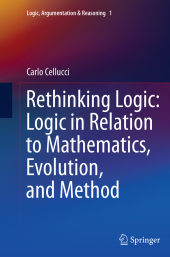 Neuerscheinungen 2016Stand: 2020-02-01 |
Schnellsuche
ISBN/Stichwort/Autor
|
Herderstraße 10
10625 Berlin
Tel.: 030 315 714 16
Fax 030 315 714 14
info@buchspektrum.de |

Carlo Cellucci
Rethinking Logic: Logic in Relation to Mathematics, Evolution, and Method
Softcover reprint of the original 1st ed. 2013. 2016. xv, 389 S. 35 SW-Abb. 235 mm
Verlag/Jahr: SPRINGER NETHERLANDS; SPRINGER 2016
ISBN: 9402401024 (9402401024)
Neue ISBN: 978-9402401028 (9789402401028)
Preis und Lieferzeit: Bitte klicken
This book examines the limitations of mathematical logic and proposes a new approach intended to overcome them. Formulates new rules of discovery, such as induction, analogy, generalization, specialization, metaphor, metonymy, definition and diagrams.
This volume examines the limitations of mathematical logic and proposes a new approach to logic intended to overcome them. To this end, the book compares mathematical logic with earlier views of logic, both in the ancient and in the modern age, including those of Plato, Aristotle, Bacon, Descartes, Leibniz, and Kant. From the comparison it is apparent that a basic limitation of mathematical logic is that it narrows down the scope of logic confining it to the study of deduction, without providing tools for discovering anything new. As a result, mathematical logic has had little impact on scientific practice.
Therefore, this volume proposes a view of logic according to which logic is intended, first of all, to provide rules of discovery, that is, non-deductive rules for finding hypotheses to solve problems. This is essential if logic is to play any relevant role in mathematics, science and even philosophy. To comply with this view of logic, this volume formulates several rules of discovery, such as induction, analogy, generalization, specialization, metaphor, metonymy, definition, and diagrams. A logic based on such rules is basically a logic of discovery, and involves a new view of the relation of logic to evolution, language, reason, method and knowledge, particularly mathematical knowledge. It also involves a new view of the relation of philosophy to knowledge. This book puts forward such new views, trying to open again many doors that the founding fathers of mathematical logic had closed historically.
trigger
Preface.- Chapter 1. Introduction.- Part I. Ancient Perspectives.- Chapter 2. The Origin of Logic.- Chapter 3. Ancient Logic and Science.- Chapter 4. The Analytic Method.- Chapter 5. The Analytic-Synthetic Method.- Chapter 6. Aristotle´s Logic: The Deductivist View.- Chapter 7. Aristotle´s Logic: The Heuristic View.- Part II. Modern Perspectives.- Chapter 8. The Method of Modern Science.- Chapter 9. The Quest for a Logic of Discovery.- Chapter 10. Frege´s Approach to Logic.- Chapter 11. Gentzen´s Approach to Logic.- Chapter 12. The Limitations of Mathematical Logic.- Chapter 13. Logic, Method, and the Psychology of Discovery.- Part III: An Alternative Perspective.- Chapter 14. Reason and Knowledge.- Chapter 15. Reason, Knowledge and Emotion.- Chapter 16. Logic, Evolution, Language and Reason.- Chapter 17. Logic, Method and Knowledge.- Chapter 18. Classifying and Justifying Inference Rules.- Chapter 19. Philosophy and Knowledge.- Part IV: Rules of Discovery.- Chapter 20. Induction and Analogy.- Chapter 21. Other Rules of Discovery.- Chapter 22. Conclusion.- References.- Name Index.- Subject Index.


